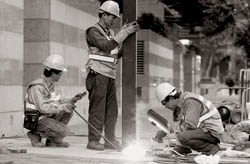|
DAILY NEWS ONLINE |
|
|
|
OTHER EDITIONS |
|
|
|
|
|
|
|
|
|
OTHER LINKS |
|
|
|
|
|
|
  |
Commonwealth chief pessimistic of WTO deal in Hong Kong, poor the losersHONG KONG, (AFP) - Developed countries have to bite the bullet and dig deeper to make this week's WTO trade talks a success and bring an end to world poverty, the head of the 53-nation Commonwealth said Monday.
On the eve of six days of trade talks in Hong Kong, Commonwealth Secretary General Don McKinnon urged rich nations not to let pass a golden opportunity to bring wealth to the poor. "More has to be given than received by the developed countries," McKinnon said in an interview with AFP. "If you see what's on the table now you're not seeing a lot of satisfaction - much more is expected." Leaders of the grouping of mostly former British colonies issued a statement last month calling for a deal at the World Trade Organisation sixth ministerial here that would scrap export subsidies by 2010. The WTO talks hope to bring down tariffs and other barriers to trade that experts say are preventing poorer economies from developing their own markets and gaining access to overseas customers. The talks have been in stalemate, however, since the United States offered to cut farm aid by 60 percent by 2010 if the EU scraps 80 percent of its subsidies. So far the Europeans have refused to budge. In a 17-point statement on multilateral trade, Commonwealth leaders called on the European Union to show movement. McKinnon said that unless the EU made more concessions the goal of this round of talks - bringing the benefits of trade to poor countries - would be lost. "At the present time our concern is that the development side of this round appears to be getting lost - it has been significantly diminished," said McKinnon. "This was the whole purpose of the round." The general secretary said the Commonwealth's 53 members - which represent 40 percent of WTO members and 20 percent of WTO trade and which range from the richest, like Britain, to the poorest, like Bangladesh - feared the chance of a deal was falling away from them. "The Uruguay round (of WTO talks) was of tremendous benefit to developed countries. Developing countries didn't get much out of it at all but they were promised that they would get it at this round," he said. "But now the signs are they are not going to get anything out of it. "Developing countries feel they gave away so much in the last round for little in return that they are not prepared to put a lot on the table now until they see something more substantial," he added. Summit chairman John Tsang said he hoped at least a deal on development could be struck even if trade talks go nowhere. He suggested a package of measures that would boost duty-free trade, improve patent and other intellectual property issues and ease access to markets for non-agricultural products could be achieved. But McKinnon said nothing could realistically be done without a deal on agriculture. "For many developing countries their only real comparative advantage is commodity production - if they can see benefits from producing commodities, principally agricultural commodities, I'm sure they'll be prepared to deal on other areas," he said. Although McKinnon said he was pessimistic that a trade deal could be done, he believed his organisation had the clout to make some difference. "We are able to cross many barriers, represent many centres in the world," he said. "If you're a small Commonwealth country no one will listen, but if you link up with other countries the likelihood of getting something is much greater," he said. |
|
|
|

